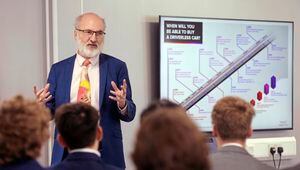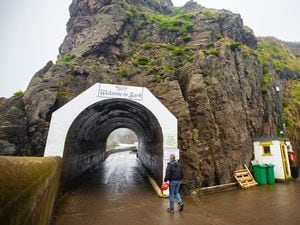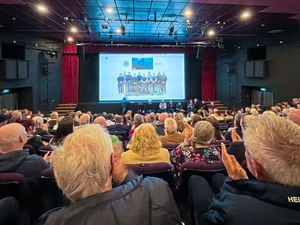‘Guernsey perfect to test driverless cars’
DRIVERLESS cars could have a perfect test bed in Guernsey, an expert in the field has said.

John Siraut, divisional director, economics, at Jacobs, has been in the island talking to students about driverless vehicles and the impacts they could have.
Jacobs is a global provider of technical, professional and scientific services, including engineering, architecture, construction, operations and maintenance.
‘I think, certainly in your [the students’] lifetime, there will be driverless cars, but maybe not to the extent some people think will happen,’ said Mr Siraut.
‘We can already see different levels of autonomous driving today with automatic brakes and cruise control.
‘There are two very advanced models today, General Motors and Waymo [Google] are the most developed, but others have a long way to go.’
One of the biggest challenges was getting AI vehicles to learn what was appropriate or not appropriate and when.
‘If your driverless car is going down a narrow lane and comes across another car, it is programmed not to pull onto private property even temporarily to let the other car pass – as we may do now.
‘Therefore, you might end up reversing half-way back up the lane to a wider point because the vehicle cannot make the same decisions as the human brain.’
He said although Guernsey did not suffer from huge levels of congestion or fast speeds, which would both see benefits of driverless cars, the island would be a great test bed for the software.
It would be a good place for vehicles to ‘learn’ aspects of the drive such as how deep a puddle they can go through or not to stop at every plastic bag in the road.
Vehicles such as buses or large delivery lorries would be ‘ideal’ for autonomy as they operate on a schedule and fixed route.
‘It would then be easy to add another driverless bus to a route during a busy time or if there was a big event on.’
Driverless vehicles, although expensive to create, would be a cheaper alternative to buses and taxis if used in the same way because they eliminate the need for human intervention, where a salary is required, to be in control of them.
Two ownership models were explained, one being a taxi model which could see a 50% reduction in vehicles, and they would be ranked at key pick-up points.
The other was a still-owned model which could see a 20% reduction in vehicles, but owners could send their cars home or keep them driving round the street until required again – in the UK this would avoid the need to pay for parking, but again does not apply in Guernsey.
Mr Siraut also presented a lecture at the Princess Royal Centre for the Performing Arts for members of the Channel Islands Group of Professional Engineers and other interested islanders.





